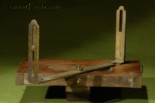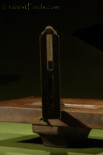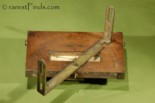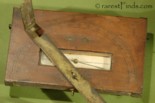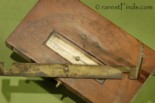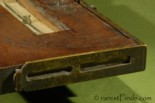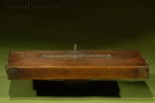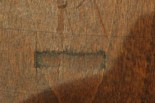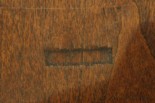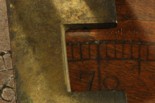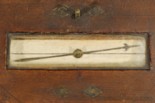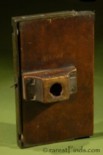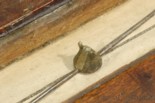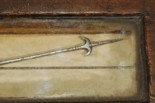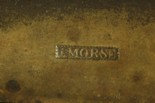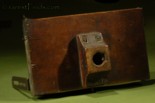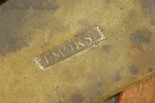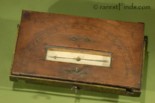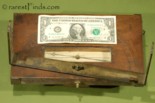The Only Known Surveying Instrument Signed J.MORSE, plus Letter To His Wife; Jedidiah Morse Is Considered The Father Of US Geography. Sold!
It is rare to find any 18th century scientific instruments; to find one signed by a famous and great American is exceptional. The semi circular circumferentor or graphometer offered here is the only known instrument signed “J.MORSE”.
The wooden body of this early instrument measures 10–7/8 by 5–7/8 inches by 7/8 of an inch, and has a nine inch protractor scale engraved with 0 - 90 - 0 degree arc graduated to single degrees as shown in picture #3. The wooden body has on the two short ends brass bands wrapped around corners to protect the wooden body or plank. The plank has a center mounted through compass or inset compass with a six inch steel needle at north adorned with fleur de lis. The rotating alidade (sighting mechanism) mounts on a screw with a brass wing-nut in the center of the plank of the protractor. The single alidade has sight-vanes on each end and cutouts to read angles on the arc protractor scale. When not in use, the “U” shaped alidade is stored straddling the wooden plank and is fastened with the same wing-nut to the long side of the plank. There is a receiving hole in the center of the base bottom for a staff mounting bracket. The alidade and wood plank are each signed in two places with “J.MORSE”.
18th century colonial surveying instruments were works of art in their own right. The beauty of the sometimes naive wooden construction, combined with the hand craftsmanship of the alidade and the through compass with the fleur de lis adorned needle, are typical for New England and stand apart from European instruments of the same period.
Jedidiah Morse (August 23, 1761 — June 9, 1826) was a significant figure in post Revolutionary New England. Reverend Morse was a prolific, deeply religious states- and clergyman, politician, writer, investor, and philanthropist. His geography textbooks became a staple for students in the United States for thirty years and earned him the sobriquet of “Father of American Geography.” In his books, Morse discusses the key traits and features of people not only in the US but of all countries in the world and openly reveals his personal biases.
For thirty years (1789 - 1820) he served as a colonial theologian as the Congregational Minister of Charlestown, Massachusetts.
A Native American scholar, he was appointed by the Secretary of War to conduct a major study on American Indians in 1820. Jedidiah published his findings in 1822 with the title, “REPORT TO THE SECRETARY OF WAR OF THE UNITED STATES ON INDIAN AFFAIRS, COMPRISING A NARRATIVE OF A TOUR,”[2].
The report was ignored by congress and never adopted. Jedidiah published the 400 page report by Davis & Force. Even so he had to borrow money from his family and friends to survive, he financed the publication of the report himself.
Philanthropist Morse´s approach to solve the “Indian problem” was too human for most politicians.
Just eight years later and four years after Jedidiah´s passing, president Andrew Jackson (presidency 1829 - 1837) signed the Indian Removal Act on May 28, 1830, putting his policy of forced displacement of Indian tribes into law.
Jedidiah Morse Jr., was one of the sons of Jedidiah Morse Sr. (July 8th, 1726 - December 29th, 1819). Morse Jr. was also refered to as Reverend Morse, while his father was referred to as Deacon Morse.
Jedidiah Morse is also (wrongly) spelled Jedediah Morse in some publications. Jedidiah Morse Jr., was married to Elizabeth Ann Finley Breese with whom he had ten children, among them Samuel F.B. Morse, American artist and inventor best known as the creator of the eponymous telegraphic code named after him.
Condition:
The instrument is complete and in all original condition with age consistent patina. The two “J. MORSE” imprints on the wooden body are illegible. the glass cover of the inset magnetic compass is original and undamaged. A half inch piece of the brass band wrapped around one of the corners is missing as shown in picture #7 (corner on the right hand side). The wing-nut if tightened too much will slip.
Jedidiha Morse´s letter to his wife, Elizabeth Ann Finley Breese Morse (1761-1828), dated December 23rd, 1795; click on any image to see larger image!
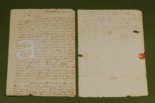
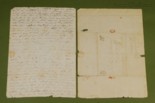
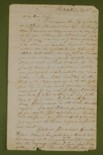
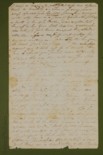
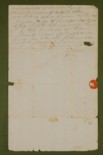
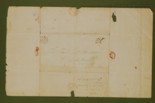
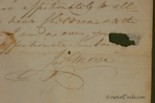
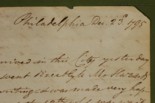
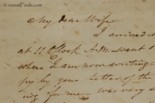
To my best abilities, the letter reads as follows:
Philadelphia Dec. 23. 1795 I came into town — he was right glad to see me and
My dear wife, hands as heartily as ever. I saw poor
I arrived in this city yesterday Miss Sproat, who has ever since her arrival
at 11 o'clock A.M. Went directly to Mr. Hazard's in this city been in a continued scene of trouble – the
where I am now writing and was made very hap– sickness and death of her only Brother, and an accidental
py by your letter of the 13th which was wait– lameness of her dear little Nephew, of whom she
ing for me. Was very sorry to hear of the death is dotingly fond, have occupied her whole
of the children you mention. They must have been attention and for me a sufficient apology for
sudden. Tell the afflicted parents I sincerely her not writing us. Mr. Blythe has gone.
condole with them. Am very glad to hear that He went some time ago. You ask for
you and the children and family and people in request me to look out for a maid. They
general are well. Thank Dr. Larkin for his are I assure you with much more difficulty
friendly toast – he is a good man and they obtained this way than with us. You will
are good people who drank it – my regards not therefore expect me to be successful
to them all. Dear little Edwd does he then in procuring you one.
think of his Papa and go up in the study to I am now writing in Dr. Green's
find him? I can easily conceive how you study. All well here and at Mr. Hazard's
must feel by my own feelings – I often think and desire love to you. I am going with
most tenderly of you and them. I long for the Dr. Green to Congress this morning and am
time to come when I shall meet you. obliged to conclude as it is time we
May God preserve us all to this desirable were going. Tell Mr. Putnam I will
event. I do not I trust forget to pray if possible write him next Post. I have
for you – and often feel a pleasure in the belief not yet possessed myself of the informa–
that though we are absent, in body we can tion I wish to communicate. Tell him,
yet meet at the throne of grace, in spirit however, that Mr. Goodhue says there is a
and in heart. decided majority of Democrats in Congress.
I shall not fail to visit Grandma Others think it doubtful, however, as a
Finley – I dined here yesterday – drank tea number appear neutral. Both parties however
last evening at Dr. Green's – and am to breakfast act with caution as if afraid of each other.
with him this morning – where I shall finish my The prophecy is there will be a peaceful
letter. I saw Rev. Mr. Baleh – soon after session. ‘Randolph’s Vindication' is consi–
dered here as a vindication of the President
and a condemnation of Randolph himself – without 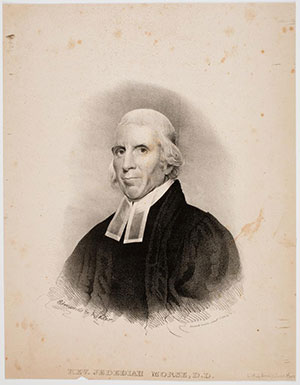 the merit however, of desiring either.
Mr. Pickering intends to answer Mr. Randolph.
I enclose a copy of Randolph's vindication
to Judge Russell – which may gratify him.
Till I write you again – adieu.
Remember me very affectionately to all
friends – love to the dear children and to
the rest of the family, I am, as ever, your
very affectionate husband
Jedh Morse
the merit however, of desiring either.
Mr. Pickering intends to answer Mr. Randolph.
I enclose a copy of Randolph's vindication
to Judge Russell – which may gratify him.
Till I write you again – adieu.
Remember me very affectionately to all
friends – love to the dear children and to
the rest of the family, I am, as ever, your
very affectionate husband
Jedh Morse
Caption to picture on the right:
“Rev. Jedediah [Jedidiah] Morse, D.D.” lithograph by James Kidder and Thomas Edwards, published by Senefelder Lithograph Company (Boston, 1831).
The letter:
Jedidiah Morse was the pastor in Charlestown Massachusetts at the time he wrote this 2½ page letter on two Folio sheets (formerly joined.) The two now separated folded sheets show minimal paper loss at the edges. There are Wax seal tears on the signature page. Addressed on the verso's address panel to “The Rev. Jedh Morse” (thus incorporating a second signature). Light staining, otherwise in very good condition, though some of the writing is light. Very rare!
Jedidiah Morse mentioned the following individuals in his letter (emphasis added in letter for easy reference):
William Baleh was Reverend of South Hampton, New Hampshire from 1802 -1816.
Benjamin Blythe American artist (b. 1746; active until 1787). The date of his death is unknown, Jedidiah´s wife was an avid painter and it is possible that she had a relationship with Blythe? Her son Samuel Morse was a known painter too.
Dr. Ashbel Green (July 6th, 1762 - May 19th, 1848). There is a letter in the collection of the Gilder Lehrman Institute of American History he wrote to Morse dated September 1, 1794. Green introduced Rev. Dr. Keith, a minister from the congregational church in Charleston, SC. He believes Morse will receive much pleasure from both Keith´s preaching and his conversations. Green apologizes for not writing often, citing that his work keeps him very busy. An undated blurb from the Newark Daily Advertiser is attached to the letter. It discusses how Green´s diary and papers will make a valuable addition to the historical literature of the early republic. Green and Morse were friends.
Green was a House Chaplain; born in Hanover, Morris County; B.A., College of New Jersey (now Princeton University), Princeton, N.J., 1783; D.D., University of Pennsylvania, Philadelphia, Pa., 1790; D.L., University of North Carolina, Chapel Hill, N.C., 1812; licensed to preach by the presbytery of New Brunswick, 1786; ordained in the Presbyterian Church, Philadelphia, Pa., 1787; orderly sergeant, New Jersey Militia; tutor, College of New Jersey (now Princeton University), Princeton, N.J., 1783 - 1785; professor, Princeton College, Princeton, N.J., 1785 - 1787; pastor, Second Presbyterian Church, Philadelphia, Pa., 1787 - 1812; member, general assembly of the Presbyterian Church of the United States of America, 1790 - 1839; clerk, Presbyterian general assembly, 1790 - 1803; president, board of directors for the Princeton Theological Seminary, Princeton, N.J., 1812 - 1848; president, Princeton College, 1812 - 1822; editor; elected Chaplain of the United States House of Representatives to the Second and to the four succeeding Congresses (November 5, 1792 - May 13, 1800); died in Philadelphia, PA; interment at Princeton Cemetery, Princeton, N.J.
Ebenezer Hazard is considered the First Historical Editor. There are surviving letters between Morse and Hazard. Hazard was the first American to attempt to preserve the documentary heritage of the nation. The publication of two volumes of American “State Papers” and significant private manuscripts, under the title of “Historical Collecitions: Consisting of State Papers and Other Authentic Documents; Intended As Materials for An History of the United States of America” (Philadelphia, 1792-1794), climaxed the dreams and struggles of twenty years. As a business venture, the publication was just short of disastrous, but Hazard performed a notable service to American historians, recognized by some of his contemporaries, but subsequently forgotten.
While preaching in New York, Morse had met Elizabeth Breese at the home of her uncle and Morse´s patron, Ebenezer Hazard. She was the daughter of a distinguished family. Her father, Samuel Breese, was a respected judge, and her mother was the granddaughter of the Reverend Samuel Finley, the president of the College of New Jersey.
Dr. Ebenizer Larkin (1769-1813) maintained a book and stationary store at 47 Cornhill, Boston Massachusetts. Mr. Larkin sold Jedidiah Morse´s books.
Edmund Jennings Randolph Governor of Virginia, (1753-1813), presented the famous “Virginia Plan” to the Constitutional Convention while serving on the committee to draft a United States Constitution in 1787. During George Washington's presidency (1732-1799), he became America's first attorney general, and succeeded Thomas Jefferson as secretary of state. However, in August 1795 the British Navy intercepted correspondence that revealed Randolph told the French minister that Washington's administration was hostile toward it. When Washington demanded an explanation, Randolph resigned. He attempted to defend his character by publishing “A Vindication of Mr. Randolph's Resignation”, mentioned in the letter offered and included here, which included a statement from the French minister in his defense. After retiring from public life, he served as an attorney in Virginia and, in 1807, defended Aaron Burr against charges of treason.
Randolph was succeeded as secretary of state by Timothy Pickering (1745-1929), who served under Washington as an adjutant general in the Continental army who represented Massachusetts in Congress as a member of the Federalist Party. The letter mentions fellow Federalist Congressman from Massachusetts,
Benjamin Goodhue (1748-1814), who is commenting on the Democratic-Republican Party founded by James Madison and Thomas Jefferson in 1792 to oppose Alexander Hamilton´s Federalist Party, and controlled the presidency for the first quarter of the 19th century.
Aaron Putnam, was one of Morse´s most important parishioners. In 1798, Morse lent Putnam twelve thousand dollars and took as security a mortgage on some of Putnam´s property in Charlestown.
History:
The semi circular circumferentor or graphometer was introduced by Philippe Danfrie in Déclaration de L'usage du Graphomètre (Paris, 1597). The instrument offered here dates to the first half of the 18th century. Most graphometers have a magnetic compass, are made of brass, and have two sets of sight vanes; this one only has one set. The instrument offered here most likely dates to the first half of the 18th century, at least a quarter of a century before Congress adopted the Declaration of Independence on July 4th 1776.
See page 69 and Plate XXXII in M.V. Brewington´s “The Peabody Collection of Navigating Instruments” for a picture and description of a very similar American semi-circumferentor (dated circa 1730).
Jedidiah Morse was born in 1761 to a New England family in Woodstock, Connecticut while the French Indian War was going on. His father, Jedidiah Morse Sr., also referred to as Deacon Morse, was married to Sarah Child Morse and was an important man in his own right: here an account about his father Jedediah Morse Sr., by Richard J. Moss, page 8, 9 [6]:
The local records and histories clearly portray Deacon Morse as an incredibly strong and robust man. Farm labor was hard labor, and the farrier business called for a measure of strength beyond that of even the most energetic farmer. Jonathan and Calvin inherited this strength. Like the deacon, they attained their independence by hard physical labor. Jedidiah, the youngest, did not inherit his father´s robust health; all the evidence suggests that he, perhaps from birth, was frail and delicate. He was, in a world based on hard and unremitting labor, incapable of establishing himself in that world.
In addition to laboring mightily on his farm and at his trade, Morse devoted countless hours to his community. At twenty-one, he resolved to “do as much good in my day and generation consistent with talents, ability and time as I was able.” After 1752, when he was elected surveyor of highways, Morse held a bewildering number of local and state offices. For eighteen years he was a selectman and was the town´s representative to thirty-one General Assemblies. Perhaps his most difficult duty was town clerk, a post he held for twenty-six years. In this position he recorded more than twenty-seven hundred deeds, leases, and land transactions, plus all the births and marriages. The task also included summarizing all the town votes and meetings that were a matter of public record. Finally, in 1774, the General Assembly appointed Morse justice of the peace for Windham County, a position he held until 1801. During his tenure in this trying job, Morse handed down 783 judgments, married sixty-five couples, compiled countless rate warrants for collecting taxes, wrote forty-five wills, and served as “Arbitrator and Auditor in many difficult and critical cases.” The church, as well as the town, chose him to occupy important positions. In July 1763, only a month after Abiel Leonard had been ordained, Jedidiah Morse and William Skinner were chosen deacons. As Morse put it, “We stood together in that relation to the church forty-three years as brothers in harmony and good agreement, and have taken sweet counsel together.” Deacon was not the only church office he held; he served as clerk and treasurer of the First Society for twenty years. Finally, the church often chose him for special assignments; for example, he was on the committee to find temporary replacements while Leonard was serving as chaplain. He also headed the committee that sought a permanent replacement.
Jedidiah Morse in Woodstock:
Jedidiah´s hometown Woodstock was growing, and this growth was forcing the sons and daughters of Woodstock to seek opportunity elsewhere. As early as 1761, groups were leaving Woodstock for Vermont, New York, and New Hampshire. The ratio between families and available land dropped steadily between 1680 and 1790. In 1680, there were 486 acres per family in Connecticut; by 1750 this figure had dropped to 166, by 1790 it was 91. This economic reality profoundly influenced the Morse family. The elder, Jedidiah Morse Sr., wanted to keep his sons, Jonathan, Calvin, and Jedidiah, near him, but it was not possible. Jonathan, the eldest, was kept in Woodstock to be the inheritor of the family farm, Calvin was given cash, and he moved to Vermont.
Jedidiah Morse at Yale:
Jedidiah was sent to New Haven Connecticut in spring of 1779, where he was admitted to be a freshman at Yale to get a College education.
Just at the time the United States and Britain signed the Treaty of Paris to end the Revolutionary War in 1783, Morse was 22 years old and still pursuing his theological studies under Jonathan Edwards and Samuel Watts at Yale. Morse, to create some income, established a school for young women in New Haven. Teaching, he realized that there was a need for a textbook on geography because, as he wrote, “so imperfect are all the accounts of America hitherto published . . . that from them very little knowledge of this country can be gained.”
When in 1784 the textbook American Geography became an instant best-seller, and its success earned him the title of, “Father of American Geography”, its financial success came as such a surprise to him, the author Jedidiah Morse, that he nearly quit his theological studies in order to become a professional geographer. However just two years later, Morse finished his undergraduate work and earned a divinity degree at Yale University in 1786.
After graduation he worked and traveled for a few years as an adjunct scholar and minister, and it was during this time that he researched and wrote his second edition of the American Geography, for which he became most known.
Jedidiah Morse as Pastor in Charlestown:
During the winter of 1788-89, while in New York, he met Elizabeth Ann Breese, daughter of Samuel Breese, of Shrewsbury, N.J., and Rebecca Finley, daughter of the Ref. Dr. Samuel Finley, President of New Jersey College. The following spring, April 30, 1789, Morse became a pastor in Charlestown, Boston (across Boston harbor), where he served until 1820.
Morse did become a pastor, but geography books provided a significant additional source of income besides the salary and housing he received from being the pastor of Charlestown. Far from being idiosyncratic, Morse´s vocation as a pastor-geographer reflected the pervasive overlap of geography textbooks and devotional literature. Geography was located between sacred and secular literacy, positioning it among the ultimate best-sellers in the early Republic. In the rural as well as the urban northern United States, records indicate that, for more than three decades, only the Bible and Noah Webster´s spelling books were more popular than geographies…. Jedidiah Morse´s best-selling textbook series, consisting of, The American Geography first edition, text only (1784); The American Geography second edition (1789); The American Universal Geography (two volumes, over sixteen hundred pages, 1793); Geography Made Easy, abridgement of the American Universal Geography (1794); and Elements of Geography, [published the year of the letter offered here] for younger readers, age eight to fourteen (1795); The American Gazetteer, the first comprehensive geography of North America, it included seven large foldout maps and seven thousand articles on the various places (1797); and The New Gazetteer (1802).
Between 1789 and 1795, he produced a geography for every level of reader. Some printings lasted for several decades and reached more than twenty editions, selling also in European countries.
From his earliest days in Charlestown, Morse was a tireless watchman, defending the orthodox view of religious truth. Thus it was not surprising that by Christmas 1789, Morse was embroiled in religious controversy which became a permanent topic through out his life.
In 1795, he received the degree of D.D. (Doctor Divinitatis) from the University of Edinburgh. He was elected a Fellow of the American Academy of Arts and Sciences in 1796.
By 1798, Morse´s reputation as a minister with a desire to make books and money had become general knowledge. His devotion to his geographical labors and the failure of his ministry, in minor and indirect ways, rose to the surface during the Illuminati crisis. The editor of Boston´s Independent Chronicle suggested that the Charlestown pastor shortchanged his flock each Sunday because he was “too anxious about the geographical description of the city of Washington or Georgia Land” and paid too little attention to “the New Jerusalem or the Land of Canaan.” Morse was, the editor claimed, “busy about many things” during the week and, as a result, failed his congregation on Sunday.Morse personally, the sermons were ritual acts that denounced the behavior he engaged in privately. Plagued by guilt and anxiety because of his publishing activities and his father´s disapproval, Morse responded by adopting a stance in his public sermons that urged gratitude and self-abasement; these sermons condemned the pride and arrogance that too often came with national and individual prosperity.
In time large numbers left to create new churches and, in 1819, the remnant dismissed him from his pastorate. This was a shocking and depressing end to thirty years in Charlestown, years that had begun with such euphoria in 1789. Morse and his family literally retreated from Charlestown to New Haven, where Morse spent the last years of his life as a philanthropist.
Jedidiah Morse as Philanthropist:
Chapter III, page 128 -167 is devoted to Morse´s activities as a philanthropist [4]. Morse´s activities as philanthropist had one goal; to teach his Orthodox Christian faith to his fellow men. After he was expelled from Charlestown, his efforts were directed towards missionary work to "help" the "ignorant uncivilized" Indians by indoctrination.
In 1787, the “Society for Propagating the Gospel among the Indians and others in North America” was incorporated by the Legislature of Massachusetts. The Society had not the requisite funds for missionary operations till it received, a bequest of thirteen thousand dollars from John Alford, a wealthy resident of Charlestown, who had died a short time before Morse´s termination as the Reverend of Charlestown. The Society elected Morse as a member in 1792, as and appointed Assistant Secretary in 1795, and on the death of Dr. Thacher in 1802 he succeeded him as Secretary.
During the summer of 1800, Morse, financed through the Society began his missionary work, propagating his Orthodox faith to Indians. The unassuming Indians even footed the bill for his efforts; in a letter to Governor of New York John Jay dated April 21st, 1797, he wrote:
"On my way from Oneida last summer, I met in New York with Mr. Jones, (Comptroller of the State), who cheered me with the information that the sale of the Indian lands would supply the funds necessary to support missionaries among the Indians of your State. Should you, Sir, and the Commissioners of Indian Affairs think proper so to appropriate the money, the Society in Boston will use their best endeavors to procure and recommend suitable persons for missionaries."Morse not only Christianized the Indians, but also the African Americans', in a letter to his father he wrote in May of 1803:
From December to April I gave lectures to the Negroes every Sabbath evening. From one hundred to three hundred attended from this town and Boston. They were very attentive, serious and grateful, and the meetings have, by the Divine blessing, contributed much to their reformation.Morse was also a member of the American Board of Commissioners for Foreign Missions, and many other organizations. He was a leader in the introduction of vaccination into the U.S., two of his three sons being among the first four persons vaccinated in America.
After leaving the parish of Charleston in 1819, Morse devoted himself to the work as missionary.
It was an eminently favorable time for the prosecution of such an enterprise. The U.S. Congress just judiciously appropriated ten-thousand dollars annually for civilizing the Indians. Mr. Calhoun, the Secretary of War, had just then (September 3rd, 1819) issued a Circular, by order of Mr. Monroe (presidency 1817 - 1825), to disclose the views of the President, and to obtain information from various individuals and Societies, whose attention was directed to this benevolent object.
Morse had become a scholar of Indians during his travels doing research related to Geography, which included descriptions of their territory and customs, and treated the Indians and African Americans with the utmost respect, the respect he was able to bring to bear against these infidels.
Morse was certainly well suited for the study but his health forced him to cut short his travels to gather information. Nevertheless, he delivered his report to the president who sent it to the house of representatives on the 2nd of January with a message. Here it remained with the Committee on Indian Affairs till the close of the Session, the 4th of March, when it was given back to its author by his request, and the next summer was published by him.
In sum, Morse called for the destruction of Indian tribal culture and all that made Indians what they were in order to save them. Their salvation was the salvation offered by the image of the rapidly disappearing New England town with its agrarian base, Christian morality, and hierarchical and patriarchal patterns of obedience. Page 137 [6].Unfortunately, after all the research this writer did, it is not known whether the instrument offered here was manufactured by Jedidiah Morse and sold for profit, or if it was his personal instrument to survey land. It is also possible that Jedidiah Morse Jr., inhereted the instrument from his father who had the same first name, Jedidiah Morse Sr., the Decean. This is feasable as Morse Sr., was elected Surveyor of Highways in 1752, he recorded more than twenty-seven hundred deeds, leases, and land transactions, and needed a surveying instrument to survey properties and planned highways, page 8, 9 [6].
The instrument offered here resembles a typical New England semi circular circumferentor made in the first half of the 18th century and would fit timewise better to be an instrument belonging to Jdidiah Morse Sr. rather than Jedidiah Morse Jr. Morse Sr. was among the fifth generation of the Anthony Morse of Newbury, MA (1635) New England progenitor line. Morse Jr. was therefore among the sixth generation.
Literature:
(Click on any title to see the online version of the book)
[1]
GEOGRAPHY MADE EASY: BEING AN ABRIDGEMENT OF THE AMERICAN GEOGRAPHY CONTAINING Astronomical Geography; Discovery and General Description of America; General View of the United States; Particular Accounts of the Thirteen United States of America, In regards to their Boundaries, Extent, Rivers, Lakes, Mountains, Productions, Character, Government, Trade, Manufactures, Curiosities, History, &c. Third Edition (1791).
[2]
Morse, Jedidiah; A Report To The Secretary Of War Of The United States, On Indian Affairs, Comprising A Narrative Of A Tour Performed In The Summer Of 1820...For The Purpose Of Ascertaining, For The Use Of The Government, The Actual State Of The Indian Tribes In Our Country. New-Haven: Davis & Force.., Printed By S. Converse, (1822).
(page 172, plan to survey land where Indian tribes were living); page 312 report about a recent survey of
[3]
Memorabilia in the life of Jedidiah Morse, D.D., formerly pastor of the First church in Charlestown, Mass., by Morse, Sidney E. 1794-1871. Published by A.W. Locke, (1867).
[4]
The life of Jedidiah Morse, D.D., by William Buell Sprague, 1795-1876. Published, New York : Anson D.F. Randolph, (1874).
[5]
MORSE GENEALOGY, COMPRISING THE DESCENDANTS OF SAMUEL, ANTHONY, WILLIAM, AND JOSEPH MORSE AND JOHN MOSS, BEING A REVISION OF THE MEMORIAL OF THE MORSES, PUBLISHED BY REV. ABNER MORSE IN 1850, by J. Howard Morse and Miss Emily W. Leavitt Under the Auspices of the Morse Society (1903).
[6]
https://trace.tennessee.edu/cgi/viewcontent.cgi?article=1002&context=utk_early-american
The Life of Jedidiah Morse, A STATION OF PECULIAR EXPOSURE, by Richard J. Moss, the University of Tennessee Press, (1995).
[7]
Triangulating Religion and the American Revolution through Jedidiah Morse by Kate Carté Engel, (2015).
More, or better, all online books by Jedidiah Morse, click here!
Inventory Number 09338;
Sold!
Update:
I learned from the buyer of this circumferentor that mostlikely neither, Jedidiah Morse Sr., nor Jedidiah Morse Jr., can be considered as the maker of this early instrument. According to the buyer, the "J.MORSE" stamp is a typical 18th century silversmith's stamp. Three generations of silversmiths with the last Name Morse and first name initial "J" were closeby in Massachusetts working as silversmiths.
The first generation was Jacob Morse, born in 1751 and died in 1819;
his son James Morse, was born in 1784 and died in 1828;
the third generation, James Harvey Morse, was born in 1829 and died in 1894.
The dates are questionable as James Harvey Morse, if it is in fact the son of James Morse, was born in 1829 even so his father died the year before. This is theoretically possible as he could have died while his wife was pregnant and gave birth the next year, the year 1829, after the death of her husband.
The buyer of this instrument, who is a collector and expert in 18th century surveying instruments, also stated that silversmiths would often make such instruments but seldom signed or stamped them.
The provenance of this instrument unquestionable confirms that Jedidiah Morse, either Senior, or by inheritance, Junior, was the owner of this instrument.
It would be interesting to research whether Jedidiah Morse was related to Jacob Morse and in what way.
